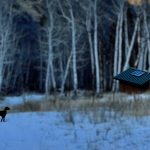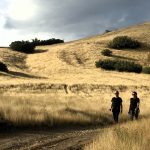
“Miles to Go before I Sleep”
This essay won first place in the 2002 BYU Studies essay contest.
Cold days were the hardest for her. A skiff of snow on the ground would mean that the air would pack around her instantly and invade every part, no matter how well insulated. She’d lose her breath for a few seconds.
She’d have to watch where she stepped and let each foot fall sort of floppily just to test the ground for slipperiness before she put any weight on it at all.
“I hate living where it’s cold. I want to move somewhere warm.” But she didn’t really want to leave the mountains, the good schools, the community, her friends.
We first bought an electric blanket with dual controls. My side was never turned on. Then she bought a heating pad to clutch to her stomach the way a football player would take a hand-off. Later, I added a heated cover, also with dual controls, for our king-sized mattress. The thermostats on our walls rarely registered below 74 degrees. I slept under a sheet and the thin layer of the electric blanket, never turned on, folding the down comforter and bedspread across her side. “Where are you under there?” I joked about her being so small and barely making a bump at all under the covers.
“I’m freezing” were her two most common words.
“You have no body fat,” I’d say.
She missed the last part of summer and fall altogether, the time when the aspens turned yellow, the squaw bush and scrub oak orange, the rocky mountain maples red. You could see the change along the top edge of Squaw Peak first, then watch it creep down the shallow draws along the front of the mountain and finally into the foothills. We had usually gone to a place where the fall colors were amazing—up and over Pole Canyon and along a dirt road to a picnic area in a bowl at the base of Windy Pass. All that was too bumpy for her now.
One year we’d taken pictures of the kids there, four-year-old Kassidy sitting in the yellow elm leaves and tossing them in the air above the wispy blonde hair that barely covered her head. “Look here, Sweetie,” my wife had said over my shoulder as I aimed the camera.
“One. Two. Three.” The boys had run from the wasps that had found nectar in our peanut butter and jelly, pests that annoyed her no end.
“Why do they come around us?”
“We’re sweet. They like us.”
“Can’t they just leave us alone for a minute?”
I laughed. “Just ignore them. If you wave your hands, they’ll just notice you more. If you run, they’ll want to play with you just like a dog does. Just ignore them.”
Everyone sat still for as long as they could, not daring to bite their sandwiches for fear they’d consume a wasp. That was before she got so cold.
I took her place on a school field trip because her strength was lagging.
“Mom would have loved this,” my youngest son had said. We’d hiked up a steep path for a mile and a half to Timpanogos Cave, coaxing other fifth-graders along. The trail was slick with rain, and I thought of her. My hood collected my thoughts as they tried to work their way out and sent them back to be thought again:
She was warm once. Pink and rosy. Wrists I could not wrap my fingers completely around, before four kids—a gradual sacrifice of body and soul. She was healthy then. I miss the healthy her.
Once we took a blanket to the top of Squaw Peak, past where people supposedly park to kiss and to a spot I knew about, where we’d parked the car and walked over a small rise to the brink of the valley. We’d sat and tried to find our house, using our fingers like the cross hairs of a scope, and felt as if we looked like Ralph Lauren models, only not nearly as maudlin—happy instead to know that we’d be together even after the pose was over.
That was then.
Her changes were very gradual. The birth of each child brought changes—a penicillin allergy, gall bladder surgery, a thyroid condition, and then more pain. Test after test, poking, prodding. A good doctor applying everything he knew, and people in the wings contributing. A full skeletal x ray showed something nonskeletal, a pooling.
The doctor explained it this way: “Radioactive tracers flow through the body outlining structures that can’t otherwise be seen with x rays. With her it pooled too early. We think there’s an obstruction.”
The long arm of science reached into a hat and finally pulled something out. “We’ve got it.” It was her liver, now made miserable by primary sclerosing cholangitis, a disease with no known cause and no cure.
“Basically, her liver is failing. The bile duct normally looks like a tree with a trunk that drains toxins into the intestines. Hers is starting to scar closed. First the fine branches way up in the liver and eventually the trunk itself.”
“How long?”
“It’s mostly just painful for now. Seven or eight years from now and you might need a new liver.”
“A new liver? How do you get a new liver?”
“From a donor . . . someone who has been declared brain dead with a family that decides to donate that person’s organs.”
“Okay, what if you don’t want a new liver?”
“Then ten years and you’re done.”
We wondered later that night how all this would happen. Even after a couple of trips to the pharmacy, we started to feel that seven or eight years was much further away than it had seemed at the doctor’s that day.
With two words, ten intervening years came crashing around us.
“I’m bleeding.”
For twelve days before Thanksgiving, we sat in a room at the hospital where she was hooked to a line dripping donated blood into her arm. No one could figure out why she was bleeding. I prayed, and everyone prayed, and we watched her slipping away.
One night after midnight, she almost left me, said she saw a light. A frenetic technician came to take her down to repeat a test that had turned up nothing a day or two earlier. We helped her into a wheelchair and took her out the door. Stop. No, go, I thought. (Her face was white, and she slumped to one side. Even though beads of perspiration dotted her forehead, she shivered without a blanket.)
We needed to know how this was happening so that the doctors could stop it. All internal parts except fifteen feet of her small intestine had been viewed through one means or another: x rays after swallowing barium, fluoroscopy, EGD, ERCP, colonoscopy, CT scan. They gave her medicines, an attempt to slow the leak that reduced blood pressure in the gut and that made her look and feel pregnant. Still, no one knew just where the leak was.
“We should go. We have a small window of time to try to get a picture of this.”
“Okay, let’s go.” We walked fast and poked at the elevator button until it arrived and walked fast again, her head to the side as we turned corners in the dark and eerily quiet hospital.
“Help . . . me!” Her words were barely audible.
The technician provided guidance. “Lift her feet. We’ve got to get her on the table.”
I kissed her forehead and tried to assure her. “Hold on. Hold on. Don’t go anywhere. Squeeze my hand. Squeeze my hand. Do it now!”
That Thanksgiving, my family gathered to share their most cherished blessings. My wife was at the dinner, our hospital stay miraculously over.
So many people had prayed and touched her life. My head was still confused by what seemed like a quick exit from the hospital after begging the doctor to try just one more thing: take her off all her medicines and not transfer her to Salt Lake for exploratory surgery. Miraculously, the leak stopped. No explanation as to why. No discoveries. Only a doctor who admitted to practicing medicine the best he could, a doctor who, in a sacred moment over the telephone, had trusted my recommendation.
Because of her bad liver, she was turning yellow. She had taken to wearing purple-tinted sunglasses wherever she went to avoid the stares and hard-to-answer questions. In the right light, her skin looked tan, more acceptable than the yellow haze that coated her eyes. The word jaundiced stood out in any conversation, sounding blasphemous and insensitive.
Just before Christmas, we drove up the canyon, parked, and walked down the trail, the wind whipping around us and flinging snow inside our hoods. She walked tentatively, snuggled in her warmest ski coat and gloves, her semi-elegant ski cap down around her ears, covering her tiny head down to her eyes. She shivered uncomfortably but tried to be a good sport.
“Your head is no larger than a cantaloupe.” She was getting smaller all the time. Her liver was not doing its job of synthesizing proteins and cleaning her blood and producing chemicals critical to digestion.
Winter solstice. We’d always gone to feed the birds on this day. She loved this celebration of winter. The boys dragged wood, and we scraped the snow back. Within moments a fire roared and pushed the night farther into the falling snow. We sprinkled seeds far and wide, especially around the trunks of trees where the grass still showed through. The kids pinned slices of bread to the branches they could reach and began tossing bread like awkward Frisbees into the higher branches. Peanut butter was generously coated on sticks and trunks, a sloppy feeding for future friends.
“Whose woods these are, I think I know. His house is in the village, though. He will not see me stopping here to watch his woods fill up with snow.” My recitation of Frost’s wintry poem seemed apropos—especially the ending. “The woods are lovely, dark and deep, but I have promises to keep. And miles to go before I sleep. And miles to go before I sleep.” I looked at her. “You have miles to go, Sweetie. For better or worse. But you’ll make it. I know you’ll make it.”
“I’m glad we’re here,” she said, sipping a mug of hot chocolate in futile defiance of the cold. I put my arm around her, compressing the down of her jacket until I found her tiny, shivering frame under it all. “Oh, there you are.”
“Why can’t I just get better?”
I found her sobbing when I came home for lunch. “I’ve prayed. I’ve gone to church. Does Heavenly Father really care about me?”
I tried to calm her down first with the party line. “Of course God cares. But miracles work on his schedule, not ours.”
That didn’t address her feelings. She was much sicker now. Her skin itched unbearably from toxins normally processed by a healthy liver. For weeks, fingernails and then a hair brush were inadequate for scratching until they put her on a medicine used to treat tuberculosis. “
It works and we’re not sure why,” the doctor explained.
That helped her sleep a little better at nights. But our morning greetings shifted from “How’d you sleep?” and “Good morning” to “Hey, it’s Mom!” and “I’m sorry to squeeze you so tight” and “Were you warm enough?” and other things that neither of us had wished to build into our daily greetings.
Despite all of this, she had never complained, never looked to the heavens with confusion and pain. Until now she had borne her illness like Job. And her concerns were not selfish. She didn’t want to get well for wellness’ sake alone.
“I want to get better. Now! I’m missing out on raising my children. I can’t help at school. I can barely cook dinner. The house is a mess. Everything is falling apart . . . ”
“You will get better. You just need a new liver.”
“I don’t want someone else’s liver. I just want the one I have to work
again.”
“I want it to work, too.” I’d tried to do my part but was feeling overwhelmed.
I buried my head in her arms and we cried together. “What do we do? How will we . . . ”
Tears and honesty have an amazing effect on the heart. Despite the calm reassurance I’d had from her initial diagnosis until now, a reassurance that everything would work out, that she would walk through this fire and come out refined in some divinely understood way, I was still scared.
“Maybe the miracle you’re looking for will happen differently than you would have it happen. Maybe you just need a new liver.”
For the first time in years, she looked at me with the acknowledgment that she was sick.
“Maybe I do.”
“She’s moved up the list to number two.”
We repeated this to friends and family members many times. After a two-year wait to get “sick enough,” she’d been officially listed for a liver transplant in early January. Now she was closer to winning a lottery for which she hadn’t even wanted to buy tickets.
We had to wait for a donor. And since this was a liver, finding a donor meant that someone else had to die—a tragedy whose only positive outcome was a gift of life for us. It was too hard to talk about that. But a few times as we’d go to bed, she’d say, “I want them to call with a liver.”
May sixth, ten fifty-eight P.M., the phone erupted in its stand. I answered it the best way I could through the haze of deep sleep. The bed shuddered as I said, “Yes . . . Yes . . . We can be there by three o’clock.”
She was shaking. “I never . . . I don’t . . . what . . . I . . . ”
Calls were made. “We’re going to the hospital to get a liver” were harder words to say than I had imagined. I sobbed on the first few utterances, but telling more people made them easier.
There, nurses prepped her and brought warm blankets for the endless cold that only she felt. At seven that morning, we were informed that the donor’s liver was a match and that it was time to go.
“I love you. You’re so brave. I’ll be praying. You’ll live forever.” Miles to go, I thought.
“They’re ready for her” cut off any other words we might have had.
With a squeeze of hands and a kiss, she was wheeled away. I could have wept except for the exhaustion that poured over me. I wanted to cry, but I didn’t. The sixth-floor waiting room would be my home that day. Calls every two hours were promised to keep us posted on her progress. The first three calls all said the same thing: “They’re removing the old liver and getting her ready.” Finally, around noon, we were told the new liver had arrived. I’m not sure what I expected, but the idea of removing the old liver without the new one standing by was simply overwhelming. By early afternoon, they were finally putting the new liver in.
Around four, the doctor came.
“She’s done. She did well. You’ll be able to see her soon.”
I went in to see her at six that evening. Intensive care can be a scary place—meters, hoses, darkened rooms that seem quiet despite the noises coming from them. She was stirring and recognized my voice. Her eyes and face were swollen from the fluids she’d received during surgery, making her nearly unrecognizable. Her arms were tied to the rails of her bed so that in her sedated state she wouldn’t pull out the breathing tube, the lines going in at her shoulders and directly to her heart, and the other monitors.
“Hi. You did well.”
She nodded. She pried her mouth open beyond the tape, gagging a bit on the breathing tube and trying to say something. When they finally removed it at nine that night, her first words to the technicians were “I love you guys!”
She was back.
By nine the next morning, she was sitting up in a chair, cheeks pinker now. The nurses kicked me out of intensive care so they could make changes and help her with a sponge bath.
When I came back, a large fan was blowing across the cold linoleum floor in her room. For the first time in a long time, I was cold. They’re freezing her out, I thought.
“How are you doing?” I gripped my shoulders with my hands, wishing I’d brought a jacket and an extra blanket, maybe a heating pad, for her.
And then words that I hadn’t heard for years. My wife’s words, made possible by the altruism of the family of a forty-six-year-old Idahoan, a family mourning their loss while we were beginning to see the life-restoring value of their donation. In a few simple words, she rolled the past ten years together and clearly declared that there were still miles to go.
“It’s too hot in here.”





